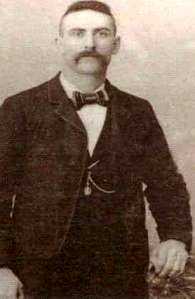La mala reputació de Pro Wrestling
Des de la seva aparició com a esport espectador a la segona meitat del segle XIX, els promotors i els lluitadors estaven sota un núvol de sospita que estaven fent els seus partits. Mentre que la lluita lliure professional finalment consistiria gairebé exclusivament en exposicions escenificades, molts, si no la majoria, dels partits eren competició legítima abans 1915.
Promoters and wrestlers went to great lengths to hide a worked match but sometimes the public would still find out the match was actually an exhibition. Reporters called these matches hippodromes. If a match was exposed as a hippodrome, it could kill professional wrestling in that locale for years to come.

Martin “Farmer” Burns from the Public Domain
Al desembre 27, 1895, Martin “Farmer” Burns and frequent opponent D.A. McMillan worked a match in Graceville, Minnesota. The exposure of this match hurt business in Minnesota for years to come.
Burns and McMillan worked the match to bilk the Graceville gamblers. The poor execution of their scheme is what led to the exposure of the match.
McMillan arrived in Graceville two weeks before Burns. McMillan told residents that he was Mr. Rundell. “Sr. Rundell” claimed he came to Graceville to see “Farmer” Burns.
After being around Graceville for a few days and studying the people, he convinced dozens of town residents that he was a skilled wrestler. He announced his plans to challenge Burns, l'actual campió nord-americà de lluita lliure de pes pesat.
Sr. Rundell said he wasn’t sure if he could beat Burns but bragged that he would win the first fall. Sr. Rundell was also ready to bet that he would score a fall in the shortest amount of time. Residents, thinking Burns would destroy the braggart, quickly placed bets that Rundell (McMillan) would be able to do neither.
When Burns arrived, Rundell made a challenge. Burns quickly accepted. No one thought to ask why the current champion would accept a challenge from an unknown wrestler.
Burns and Rundell had training camps on opposite ends of town. They staged several street confrontations, which hyped up the match and led to more wagering. Tickets were between $1 i $3 with almost the entire town, including the entire local government, turning out for the match.
When the match occurred on December 27th, locals were shocked when Rundell won the first fall with a hammerlock and body hold. Some of the smarter gamblers began to suspect a setup. As Rundell’s men collected the first round of bets, Burns and Rundell prepared for the second fall.
Burns won the next two falls. Burns secured the third fall in less than five minutes. Towns people breathed a sigh of relief as they figured Rundell at least lost the quickest fall bet. Ten minutes later, most of the gamblers realized they had been had.
Rundell rushed Burns at the start of the fourth fall. Within 3 acta, 30 segon, Rundell pinned Burns. As soon as Rundell’s men collected the second bet, Burns needed only 5 miniutes to beat Rundell for the third fall and match.
Faced with an angry crowd, both men quickly left town. Però, a reporter figured out Duncan McMillan was Mr. Rundell. News of the incident quickly spread. As Burns was a well-thought of wrestler and trainer, his involvement in this incident further hurt professional wrestling’s image.
Greed normally motivated these schemes, which led to significant money scores but hurt professional wrestling in the long-term. Greed was often professional wrestling’s biggest obstacle in gaining respectability.
You can leave a comment or ask a question about this or any post on my La pàgina de Facebook.
Source: Saint Paul Daily Globe (St. Paul, Minnesota), Gener 4, 1896 edition, p. 5

